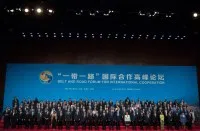The protectionist policies of Donald Trump have created a Cold War style “space race” between chip manufacturing giants in China and the United States. This time however the goal is not to orbit the earth or walk on the moon but something far more central to the daily lives of all people. As the smartphone has become central to modern business, communication and entertainment needs, the next leap forward in mobile technology is 5G, a term which denotes ultra fast internet speeds and expanded bandwidth for users. 5G technology well help to make smartphones more functional as the mini-computers that they are while also allowing for a pocket sized multimedia library at one’s finger tips due to the ultra-fast speeds on 5G networks. Most importantly, as developing nations look to improve their national internet speeds, 5G has the potential to allow for the rapid development of internet infrastructure in such nations in a way that is less reliant on subterranean fibreoptic cable. As a result 5G can help to bring high speed internet to even the remotest areas at a comparatively low cost.
In terms of the “space race” analogy China has already come out ahead of the United States as tech giant Huawei which has infamously been shut out of the US market due to protectionist measures has unveiled its new Kirin 980 chipset which will form a crucial component of new 5G smartphones. By contrast, US manufactures Qualcomm and Apple are not expected to release their 5G ready chipset until 2019.
While the space race of the 1950s and 1960s meant little to the ordinary person beyond creating feelings of national pride, today’s 5G race means the difference between holding the technology of yesterday versus that of tomorrow in one’s hand. As it now seems likely that Huawei will be the first company in the world to manufacture a shelf-ready 5G capable smartphone device, American consumers hungry for the latest in technology may be disappointed unless Washington lifts its protectionist measures against China.
But while this may appear to be merely a consumer issue with few geopolitical or psychological implications, this is far from the case. At the beginning of Deng Xiaoping’s market socialist revolution of 1978, Chinese goods entering major international markets were not known for quality. The same was true at the beginning of Japan’s manufacturing revolution when the tag ‘Made in Japan’ was colloquially referred to with the intentionally insulting slogan “Jap crap” throughout parts of the western world.
As part of Xi Jinping’s plan to transform the concept of “made in China” to “created in China”, entrepreneurs, scientists, and manufactures throughout the country are working on the next generation of Chinese products that will not only be affordable, well made and reliable but will also be technologically trend setting status symbols with both practical superiority and psychological desirability.
In terms of daily transactions, China is already far ahead of the United States as mobile payments are now the most common means of transacting in retail. While the US remains burdened with cash and the presence of long obsolete mag-stripe credit cards which even lag behind the EMV chip-and-pin standard, China is ahead of the entire west when it comes to modern, fast, secure and convenient payment options.
But while few consumers in one country tend to be aware of payment systems abroad unless they are frequent travellers, when it comes to a globally valued product such as smartphones, consumers are generally more aware of global markets. Streets and shopping malls in the United States have long been infamous for people sometimes camping out over night to be the first to get the latest iPhone. Now though that Huawei is ahead of Apple in the race for 5G, those same shoppers will be disappointed to know that their own government is retarding their ability to purchase the phone of their choice with their own money. In a country that prides itself on consumer freedoms, such a reality could rightly be called un-American.
The Hellenic philosopher Plato once wrote of the Allegory of the Cave. Here, Plato recalls an allegory told by Socrates wherein a group of men are chained inside a cave. Their only source of cognitive stimulation was seeing shadows cast on the well in front of them as men behind the prisoners held up objects before a fire which then cast the shadows on the wall. One day, one of the prisoners was freed and ran to the surface. At first the bright sunlight blinded the prisoner but eventually he was able to see the world in all its visible beauty.
After seeing visible objects as opposed to their shadowy representations, he returned to the cave to tell the other prisoners about his discovery. Of course, on returning to the cave, the man’s vision again became temporarily impaired as its common when one’s eyes are adjusting from extreme brightness to extreme darkness. Not wanting to investigate the mans’ claims objectively, Socrates recalls that such a man would be killed by his fellow prisoners rather than being believed.
This is the reality of protectionism. Those who champion protectionism seek to keep one’s domestic consumer base ignorant of the technological advances occurring abroad. Because of this, someone with a slow smartphone, poorly made car or obsolete mag-stripe credit card will not know what he or she is being deprived of. However, when it comes to 5G technology, the internet is already abuzz with discussions of China’s breakthrough. Because of this, many American consumers have been partially freed from the cave but they still will not be able to see the fully sunlight world unless their protectionist shackles are removed.
Free trade would actually encourage US companies to intensify their own 5G technologies as they would not want to lose out on a substantial share of their market to Huawei. But since Huawei has been pushed out of the US market through restrictive government measures, US chip makers can afford to fall behind because the average consumer won’t be able to do anything about it.
A world of free men and women cannot reach their full potential in a modern society without free trade. China’s leadership realises this implicitly. It is high time for the US leadership to realise the same.




